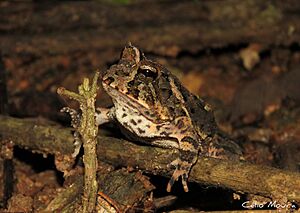Proceratophrys cristiceps facts for kids
Quick facts for kids Proceratophrys cristiceps |
|
|---|---|
| Conservation status | |
| Scientific classification | |
| Synonyms | |
|
Proceratophrys cristiceps is a special type of frog that lives only in northeastern Brazil. It's also known as Muller's smooth horned frog. This frog belongs to a family called Odontophrynidae. You can find it along the coast, from the Bay of All Saints in central Bahia all the way up to the state of Rio Grande do Norte.
What Does Muller's Smooth Horned Frog Look Like?
Adult male frogs are about 40 to 50 millimeters (about 1.5 to 2 inches) long. Adult females are a bit bigger, around 44 to 45 millimeters (about 1.7 inches) long. This measurement is taken from their snout to their rear end.
Their head is wider than it is long. The front of their face, called the snout, looks rounded from above. But from the side, it looks a bit blunt. You can't easily see their eardrum, which is called the tympanum.
Their skin has many small bumps and tiny grains, especially on their back. Their belly, hands, and feet also have lots of small, round bumps. The color of their back is a mix of different shades of brown, like a marble pattern, on a creamy background. Sometimes, they might even have a reddish tint.
Where Does This Frog Live?
Proceratophrys cristiceps lives in two main types of forests in Brazil. One is the Atlantic Forest, which is a wet, green forest. The other is the Caatinga, which is a drier forest. They also live in the areas where these two forests meet.
Male frogs like to call out near temporary streams. These are streams that might dry up during certain times of the year. The female frogs lay their eggs in these streams. Later, the baby frogs, called tadpoles, grow and develop there.
Protecting This Frog
This frog species is quite common right now. However, its home is slowly shrinking. This is mainly because people are using the land for farming and raising animals. Forests are also being cut down, and new towns are being built. Fires can also destroy their habitat.
Luckily, this frog lives in several protected areas. These special places help keep their homes safe from harm.



